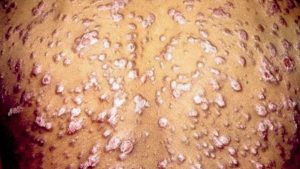A rise in popularity of online dating apps could be contributing to a sudden surge of sexually transmitted infections across Melbourne, epidemiologists warn.
It comes as Alfred Health experts reported an increase in syphilis across Melbourne’s outer suburbs, with a 45 per cent spike in notified cases.
Ophthalmologists have also reported a twenty-fold increase in people presenting with syphilis-related eye infections as Melbourne grapples with the “epidemic”.
Deakin University epidemiologist Catherine Bennett said an increase in online dating and casual sex, and people missing early signs of infection, had contributed to the explosion of cases.
“People have become less reliant on social events to find partners, and while socialising was restricted over the last 12 months, dating sites haven't been restricted in the same way – they’ve become a little more important in terms of linking up with others,” she said.
“It obviously increasing the chances, the more likelihood to have more casual partners, then all of that contributes to the risk of picking up STIs such as syphilis.”
[caption id="attachment_9346" align="aligncenter" width="1101"] Health experts reported an increase in syphilis across Melbourne’s outer suburbs, with a 45 per cent spike in notified cases.Source:Supplied[/caption]
Health experts reported an increase in syphilis across Melbourne’s outer suburbs, with a 45 per cent spike in notified cases.Source:Supplied[/caption]
Dr Bennett also worried that people “concerned about going to a GP clinic during COVID” missed early signs of infection and risked eye-related syphilis complications.
She urged people to get treated if they noticed any symptoms or were concerned they had contracted the infection.
In the early 2000s the Royal Victorian Eye and Ear Hospital recorded approximately two cases per year of ocular syphilis.
A team of doctors at the hospital in East Melbourne then researched the condition from 2006 to 2019.
In 2018, 17 cases of ocular syphilis were recorded, with infections increasing to 21 in 2019, seven of whom were women.
Once syphilis bacteria enters the body it can spread to different organs – including the eye – and if untreated can cause “irreversible damage” such as permanent blindness.
Syphilis starts with an appearance of sores or ulcers before developing into a rash.
If untreated, it could eventually cause a brain infection, dementia and blindness.
It can be cured with penicillin, but people may not seek treatment because they do not realise they have been infected, as syphilis is often asymptomatic following signs of the initial infection.
SOURCE: news.com.au



